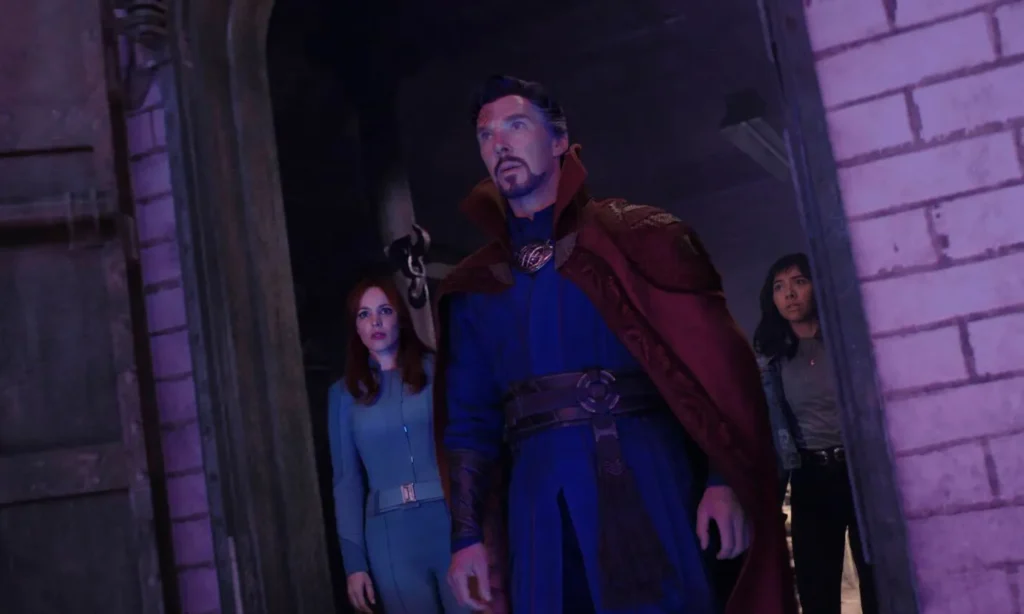Doctor Strange in The Multiverse of Madness is a bloated mess with no sense of purpose
Written by Ian Thomas Malone, Posted in Blog, Movie Reviews, Pop Culture
The MCU has changed quite a bit in the six years since Doctor Strange’s first film was released. The arrogant sorcerer, masterfully played by Benedict Cumberbatch, first came on the scene just in time for the major crossover Avengers: Infinity War that tied the whole universe together, now finds himself among its few true elder statesmen in the post-Endgame landscape that’s still very much in the process of defining itself. Doctor Strange in the Multiverse of Madness doesn’t just need to balance the awkward layover period between its predecessor and the events of Endgame, on top of the game-changing revelations in Spider-Man: No Way Home, but also a television show like Wandavision that its star wasn’t even in.
The first three phases of the MCU carried a steady stream of interconnectivity that the franchise doesn’t necessarily need anymore. There is no Infinity Saga to spend the next ten years planning for. As a team, the Avengers only really exist as an easter egg reference. As much as it might feel like The Multiverse of Madness is carrying all this weight of exposition, Doctor Strange has never been freer to enjoy his own movie.
As a character, Doctor Strange is not happy. Saving the world did not bring him peace. It didn’t bring him love either, as Christine Palmer (Rachel McAdams) moved on from his endless antics. The arrival of multiverse-traveler America Chavez (Xochitl Gomez) gives Strange a moment to care about someone other than himself. Unfortunately for the world, another magical selfish superhero Wanda Maximoff (Elizabeth Olsen) needs America’s powers to reunite herself with her non-existent children that she previously conjured up while enslaving an entire town.
Director Sam Raimi helped usher in the modern superhero era with Spider-Man back in 2002, a franchise that didn’t need to worry about the sticky webs of connectivity. The Multiverse of Madness is stuck in a weird no man’s land, following far too many unnecessary strands of plot from the first Doctor Strange, while barely paying lip service to the themes presented in Wandavision, which anchor the entire motivation of this film’s antagonist.
Wanda Maximoff has been an important part of the MCU since her 2014 debut in Avengers: Age of Ultron. The Scarlet Witch and Doctor Strange are two of the most powerful superheroes in Marvel canon, a fact that is easy to forget on screen, as most of the characters tend to just shoot the same kind of laser beams at each other, a dynamic that negatively impacted Wandavision’s own finale. The Multiverse of Madness strips Wanda of anything that made her a compelling character, reducing her complexity to that of a shrill Karen throwing a cosmic level tempter-tantrum.
To say that this film does Wanda dirty is kind of an understatement. Raimi, the man who played a pivotal role in crafting Xena: Warrior Princess, helmed this absolutely disgusting hatchet job of the MCU’s most compelling female character. The Multiverse of Madness is a disgrace to the idea that the MCU actually cares about building characters, a slap in the face to anyone who dared invest themselves in the idea of Wanda as anything more than a disposable commodity for all these years.
The Multiverse of Madness has no idea what it wants to be as a movie. Raimi throws some impressive horror visuals around, without fully committing to the idea of this being a horror film. Like Strange’s relationship with Peter Parker, itself modeled off Parker’s dynamic with Tony Stark, Chavez forces the crabby doctor to open up as a person. The chemistry between Cumberbatch and Gomez is entertaining to watch, but it’s not really in service to the same narrative wavelength as Wanda’s antics and Raimi’s horror aspirations. The 126-minute runtime feels way longer with a third act that’s so sluggish that it’s never quite clear what this movie is trying to be.
Raimi’s technical skills as a director do help buoy the experience. Marvel is still way too enamored with green screens, but the visuals are a sight to behold. Wong (Benedict Wong) is tragically underused, especially after a few cameos in other films. Palmer and fellow Doctor Strange returnee Karl Morto (Chiwetel Ejiofor) are well-utilized in a narrative that has far too many compelling characters already.
Doctor Strange and the Multiverse of Madness is an entertaining film. That should be a given considering the talent involved. The script is a disaster, full of painfully boring exposition that can be hard to parse even for those of us who’ve read most of the Doctor Strange comics dating back to the 1960s. The film loses its own train of thought time and time again, leaving the narrative to be carried by the cast and the special effects department.
This is not a good movie. This is not a good sign for the direction of the MCU. No one expects a massive crossover like Infinity War, ten years in the making. What might be nice is a standalone movie that understands how to function as a cohesive narrative. The Multiverse of Madness is not in fact over-encumbered with the weight of the franchise. It doesn’t need to plan for anything. This movie is just bad at juggling its pieces. A charming mess, fine, but everyone here is capable of so much more.











